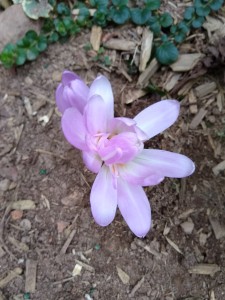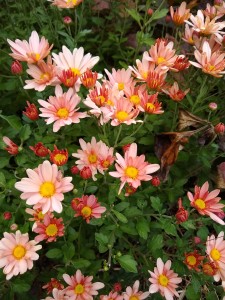 There is something wonderful about coming back to the garden after a trip. My homecoming ritual always starts with a walk around the garden to reintroduce myself to the plants and see what has changed in my absence. And something has always changed, even if I have only been away for a weekend. Flowers bloom and fade, weeds ply their invasive trade, and something surprising has almost always taken place.
There is something wonderful about coming back to the garden after a trip. My homecoming ritual always starts with a walk around the garden to reintroduce myself to the plants and see what has changed in my absence. And something has always changed, even if I have only been away for a weekend. Flowers bloom and fade, weeds ply their invasive trade, and something surprising has almost always taken place.
When I returned from a recent weekend away, I found that fall had crept in and settled gently on my garden. Most of the plants embraced it like an old friend. Only the riotously-colored coleus, still blooming as if it were the Fourth of July, hadn’t noticed.
The tall Joe Pye-weeds, which had been making their way skyward since their late spring launch, had finished their run. The huge, dusty pink-purple flowerheads had morphed into fuzzy seedheads.
But those spent flowers left a souvenir—fragrance. As I cut back the tall stalks, a strong, sweet scent reminiscent of fresh-cut hay surrounded me.
The butterflies that danced like coquettes around the Joe Pyes a month ago had turned their attention to the newly opened asters and untamed boneset.
There were fewer butterflies than before I left. Plenty of white cabbage butterflies remained, but they are always first to arrive in the spring and the last survivors in the fall. While I was away, the cabbages started making hay in the asters, accompanied by a couple of golden sulphur butterflies, a red admiral and two monarchs. A tattered old swallowtail passed through just as I returned, but didn’t stay.
I am glad that in my absence the butterflies didn’t disappear completely. I mark the change of seasons by their presence. Before long they will be gone and silence will descend on the garden. The sound of fluttering butterfly, moth and skipper wings is beyond human hearing, but the absence of those sounds is noticeable—at least to me. “Hearing” the garden, whether it is the sound of butterfly wings or the whispers of the plants, is part of feeling your garden and being in tune with the natural world.
I arrived home to find that the annual cycle of weeds had come full circle, with the summer crabgrass ceding pride of place to the same onion grass that I fought last spring.
I am not sure that weed growth is strictly a good outcome of absence, but it is inevitable. The good comes from the fact that a return to the beds and borders means a renewed awareness of those weeds, which generally motivates me to get out and do something about them. I pull them or smother them with layers of newspaper and mulch. While I commit those acts of herbicide, I find out what is really going on at ground level. Getting on my knees to weed also gives me the worm’s eye view of other developments, like the arrival of aphids to suck the vital juices out of my glorious hibiscus, the new incursions of deer in the patches of autumn-flowering anemones and the fact that squirrels are already digging up newly planted bulbs and flinging them into the grass. I also reconnect with the desirable plants. The benefits are tangible—a neater garden—as well as psychological.
If I were rich and had someone to do the gardening while I was away, I am not sure I would feel the same joy on return. Maybe I would. After all, there is something wonderful about coming home and finding that all is as you left it, or better. And there are still surprises as plants grow and change.
But then I remember the late Bunny Mellon, who had more money than most of us can ever imagine. She also had a small army of people to tend the sumptuous gardens she established at her various residences. I am sure that when she returned from her travels, her gardens were always impeccable. Despite that, she did her garden tours with clippers in hand, ready to prune. The only difference between Bunny and me—aside from the handsome fortune—is that she left little piles of trimmings for her gardeners to pick up. I have to clear away my own.
Travel broadens your horizons. Coming home after a trip can broaden your appreciation of your own space. Balanced lives and good gardens benefit from both.
